- Home
- Darrell Maloney
It Can't Be Her Page 11
It Can't Be Her Read online
Page 11
Had indeed said over and over again that Tillie would come for her.
She, among all the doubters around her, believed that Tillie would somehow find her and that they’d be reunited at last.
-32-
It’s been said that killers always return to the scene of their crimes.
That’s an overgeneralization.
It’s not true.
They don’t always go back.
But a surprising number of them do.
No one really knows why, exactly. Psychologists who study the twisted minds of such people think it’s because they want to relive their deed.
They want to experience once again the way they felt at having the ultimate power and control over the people they killed.
The shrinks say that includes going back to the scene to experience once again the sights, the smells, the vibes, if you will, of the place where they exerted their greatest victories over their victims.
For really, there cannot be a greater control over someone than by taking that someone’s life.
In the 1970s two psychologists named Medley and Smith interviewed over two hundred confessed killers who weren’t arrested right away. These were (mostly) men who were on the loose for months after their crimes, and who lived in fairly close proximity to where their crimes were committed.
Close enough to easily go back if they wanted to.
They posed the question: Did you revisit the scene of your crime?
Over eighty percent said they did. At least once, and some several times.
The follow-up question was, of course, “Why?”
Most of them described the feeling they got at the crime scene as a “rush.” For some it was almost orgasmic.
It was at that place, more than anywhere else on earth, where it was possible for them to relive their crimes without actually having to go out and kill someone else.
Just being in the location where they’d killed made it easier to relive the killing again without the obvious risk.
Oh, there was some risk.
Not the risk of being caught while killing a new victim, but rather by being caught by returning to the scene of the original crime.
For there have been documented cases… many, in fact… of frustrated and desperate detectives staking out murder scenes in the hopes their killers would return to them.
It usually occurs when the detective has run out of leads and is afraid the crime will go unsolved.
He has a case to solve and time on his hands to do it because he’s already interviewed all his witnesses, already determined there’s no DNA evidence, already exhausted all clues.
So he waits. Or he has someone else wait.
And sometimes someone comes along.
Someone who seems just a little bit out of place. Just a little bit suspicious.
And sometimes recognizable as a suspect, or someone who was interviewed as a person of interest.
Those two things together: a suspect or designated person of interest who visited the crime scene added up to a winning equation for the detective.
Because it always, without exception, correctly identified the person of interest as the murderer.
As an added reward for the detective’s efforts, the mere fact the killer returned to the scene of the crime provided a great piece of evidence of his guilt at the killer’s trial.
After all, who besides the killer himself would feel a need to go back to a place where someone lost their life?
Such evidence was always presented at trial.
It was always decried as circumstantial by defense attorneys.
It was frequently discarded by the judge as so, and juries were told to disregard it.
But anyone who’s ever served on a jury knows it’s impossible to “disregard” such evidence once it’s been placed before them.
Even if they’re prohibited from considering or discussing such evidence during deliberations, it still resides in the back of jurors’ minds.
Which of course is why the prosecution brought it up to begin with.
Prosecutors know that during a close deliberation jurors will be grasping at any straw they can find to help sway them toward a verdict.
They also know that sometimes it’s a piece of the puzzle as small as the accused returning to the crime scene in the middle of the night to sway a juror toward a guilty vote.
For in the juror’s mind an innocent man would have no reason to do such a thing.
Tom didn’t know any of this.
He wasn’t a seasoned detective, or even a seasoned law enforcement professional for that matter.
But John Castro was.
When John decided to become a policeman in San Antonio he realistically knew the odds were against him.
After all, he’d left a leg in Iraq.
He was no longer whole.
The SAPD had a regulation which prohibited the hiring of people with prosthetic legs or arms.
“Every one of our officers,” they tried to explain to John, “may be in a position to pursue a criminal at any time. A criminal can easily outrun an officer with a prosthetic leg.”
John countered, “That same criminal can outrun a fat man. Yet you allow some of your officers to be overweight. That same criminal can outrun an officer who is out of shape. Yet you have no requirement for your officers to be in top physical form.
“That same criminal can outrun an officer with gray hair. Yet you don’t fire all your officers who start to get old.
“Look,” John said. “I’m not asking for special favors. I’m just asking for an equal chance to compete for the job.”
It took the chief of police granting a waiver for John to attend the police academy to prove himself.
And prove himself he did, outperforming every other cadet academically as well as physically.
He outran them. He out-shot them. He outthought them.
On the obstacle course he finished first, breaking the Academy record. Then he ran back to encourage the stragglers through the finish line.
But that wasn’t enough for John Castro.
Once he was on the force, prosthetic leg and all, he dove head first into the profession.
On weekends and at night he took courses in criminal justice.
He wanted to become the best policeman the SAPD ever had, just as he’d tried to be the best Marine in the Corps.
To do that he had to learn as much as he could about police work.
It was while taking a course called, “Inside the Mind of a Killer” that he learned about the murderer’s habit of returning to the scene of his crime.
After they buried Anne’s body in Sara’s grave he saw how frustrated Tom was at the lack of leads and mentioned it in passing.
“I would recommend you go back to that burn bit every few days,” John told him.
“See if there are footprints which weren’t there the time before.
“If there are, lay a trap. If he goes back once, chances are he’ll go back again and again.”
It was but a single suggestion, made in passing during a larger conversation.
But the thought sat in the back of Tom’s mind and festered until he decided, “Why not?”
He had nothing to lose.
-33-
Three days after they put Anne into the ground Tom was fit to be tied.
They’d covered most of the county looking for a man who fit the description of the killer.
One of the searchers knew a prepper who actually had a working copier he’d been able to protect from the EMPs. It cost the county an acre of unused municipal real estate, but they were able to obtain a hundred copies of Dottie McMurphy’s sketch.
For the first time the searchers could show the suspect’s face to the citizens they queried instead of just describing him.
Tom mistakenly allowed himself to get his hopes up the killer would soon be captured.
But that wasn’t the case.
He’d either gone to ground or
he’d slipped out of the area.
Tom couldn’t bring his Sara back.
He’d failed her and let be captured and killed.
He couldn’t undo that either.
The next best thing would be to capture the monster who killed her and to make sure he paid.
To make sure he never hurt anyone else again.
And now, three days after they buried the woman they believed to be Sara, it appeared that was slipping away as well.
That was when John first suggested to Tom he revisit the crime scene.
“Look at the footprints. See if there are any new ones that shouldn’t be there.”
And Tom did just that.
In late morning on the fourth day after the funeral, when the sun was high in the sky and it was easy to see, he went back to Anne’s burn pit.
And he grew even more frustrated than ever.
In the area immediately around the place where they’d found the body there were literally hundreds of footprints.
They’d been left by Tom and John and all the searchers and deputies who’d come running to the scene after the body was discovered.
Quite literally, the crime scene had been trampled.
Some footprints had very distinctive treds. Some had little treds at all. Some were trampled over by others.
And the worst part of it was Tom had no way of knowing which ones were left by whom. Which ones might be new, and which ones were put there when they collected the body.
Which ones belonged to the good guys and which ones were the monster’s.
He grew more frustrated and sullen as well.
That evening he mentioned the footprints to Scott.
“I think I can help you there,” Scott offered.
“How so?”
“Remember I told you I had some stuff in my Faraday barn? The building where I lined the interior with a layer of sheet metal and a layer of thin plywood?”
“Yeah. So?”
“So the barn door just happened to be closed when the second wave of EMPs hit. Not because we foresaw the second wave, but because it looked like rain that evening and we didn’t want everything to get wet.”
“I don’t follow you, Scott.”
“Had the door been left open like it normally was, the EMPs would have been able to penetrate the building and would have destroyed most of the electronics stored inside.
“Since we closed the door that evening, though, the EMPs hit the sheet metal inner lining and danced around the exterior of the building, but didn’t penetrate it. All the stuff inside the barn survived.”
“Yeah. So pardon me for being so blunt, but exactly how does that help me out with my footprint problem?”
“Because one of the things I have in the barn is a digital camera. Brand new, still in the box. And a tablet you can use to download the photos and examine them closely.”
Tom now understood.
“You want me to take photos of the crime scene. Then go back the next day to compare the ground with the photos to see if there are any additional footprints.”
“Exactly. If you take a series of photos today you can download them onto the tablet and stand in the same spots you did when you took the photos. Look first at the picture on the tablet, then examine the ground.
“If there are any additional footprints there it should be easy to spot them.”
“That sounds like a lot of work. In fact, it sounds like a pain in the ass.”
Scott shrugged.
“So don’t do it then.”
“Oh, I didn’t say I wasn’t gonna do it. And I didn’t say it wasn’t a great idea. I just said it was gonna be a pain in the ass.”
“Perhaps so, my very old and very grouchy friend. But we’ve canvassed most of the county looking for our killer and haven’t had any luck at all.
“Maybe it’s time to think outside the box.”
It was too late to go back to Anne’s burn pit that evening. The sun would be setting within an hour or so.
But there was plenty of time for Scott to take the new camera out of its box and to show Tom how to use it.
The tablet was also brand new and its battery had to be charged for the first time.
“Take your pics tomorrow,” Scott advised. “I’d recommend you do it at noon time, because the shadows won’t skew the way the footprints look at different times of day.
“Then the day after tomorrow you can go back at the same time. I’ll have loaded the photos on the tablet by then and you can go fishing for your killer.
“Can I ask you something, Tom?”
“Sure.”
“What’s your plan if you find additional footprints when you go back the second time?”
“Then I’m going to assume if he came back once he’ll come back again. And I’ll start spending my days in the woods, watching the place.”
“And if he comes back a second time, what are you going to do?”
“I’m going to kill him.”
-34-
Sara awoke with a start.
It wasn’t a noise which woke her up.
At least not as far as she could tell.
It was pitch black, as it always was when her captor was either gone or sleeping.
She hoped he’d left her again, for it was while he was gone he was most likely to be captured.
Early on she was afraid of that: that he would leave and be captured. Her reasoning was that if he went out in a blaze of glory without telling Tom and the others where she was being held, they wouldn’t be able to rescue her.
She’d die of thirst all alone in a darkened basement and probably wouldn’t be found for years.
Then it dawned on her that might be a better way to go than whatever her captor had in store for her.
On this particular day… or night, since in the blackness of the basement it was impossible to tell… she was not alone.
Across the room she could hear Jeff snoring.
But very softly.
So it wasn’t his snoring which woke her up either.
She wondered what it was.
Then she shifted slightly to take the pressure off her left arm and felt a stab of pain in her back.
That, she remembered, was what woke her up.
The human body is not made for lying in the same position day after day.
It was pure agony to stay in one position, her arms and legs spread and tied to the bed posts, with very little ability to move.
And no chance at all to roll over.
Her arms and legs were constantly falling asleep, forcing her to thrash them around as best she could in an effort to wake them up again.
Her efforts were largely in vain.
Her right hand was taped a bit tighter than the left, and she hadn’t felt the fingers on that hand in at least three days.
Part of being held captive in a place one doesn’t want to be are the endless hours of thinking.
For really, there aren’t a lot of other things to do.
Lying there in the dark, hour after hour, Sara thought of a lot of different things.
First and foremost, of course, was devising her escape plan.
She only hoped she had the chance to implement it before he killed her.
She pondered other things as well.
She wondered how many days she’d been there.
She wondered whether it was day or night.
She’d looked around the room several times when Jeff turned on the lights and didn’t see anything which resembled a window.
And in the pitch blackness she never caught a hint of sunlight coming through a crack.
She honestly didn’t know whether it was the middle of the afternoon or three in the morning.
She wondered how long the human body could survive without food.
Her abdomen was cramping severely now from lack of nourishment. Her stomach growled ferociously the first couple of days but now was oddly quiet.
She supposed it had given up on b
eing fed.
The only good thing she could think of about not eating was she didn’t suffer the humiliation of soiling herself and having to lie in it.
It was bad enough lying in her own urine.
The wet sheets were causing a rash on her buttocks and back. They itched and burned constantly.
She knew that lying in one spot for too long would open up bed sores on her body.
She remembered hearing her grandmother talk of bed sores on her bedridden grandfather once.
She’d never had one herself, though, or knew what they looked like.
Or felt like.
She wasn’t looking forward to finding out.
But then again, it was just one more misery which would pile on with many others.
Jeff’s snoring suddenly stopped.
His breathing was labored and loud.
He coughed once and sputtered.
He was waking up.
Sara once again went into full panic mode. Every morning since she’d been there he’d awakened in an amorous mood.
She knew what was coming and already wanted to puke.
She heard him sit up.
He said, in a hoarse voice, “Good morning Princess. Did you sleep well?”
She couldn’t answer, of course. Not with duct tape coursed several times around her head.
She wouldn’t have answered anyway.
He was a waste of oxygen and undeserving of a response.
A tiny light suddenly appeared as he sparked his lighter. Then a bigger light as he lit the oil lantern at his feet.
He held it out in front of him so he could see his captive across the room.
Sara kept her eyes clamped tightly closed and pretended to be asleep.
Maybe he’d find just a hint of humanity in his cold heart and spare her this morning.
She knew in her own heart that wasn’t likely to happen.
They’d played the same charade every morning and he hadn’t spared her yet.
In what she’d learned to recognize as a bizarre early morning ritual he threw himself on the floor and did twenty nine push-ups, counting them out in what she believed to be German.
Why German, she didn’t know. Why twenty-nine she didn’t know either.
After he got to neun und zwanzig he jumped to his feet, whistled what he told her the second day was the German national anthem while he stood at attention, then yelled “All hail mighty Satan!”

 A Perilous Journey
A Perilous Journey The Yellowstone Event: Book 6: The Aftermath
The Yellowstone Event: Book 6: The Aftermath Eden Bound
Eden Bound Without Warning
Without Warning Everything Has Changed
Everything Has Changed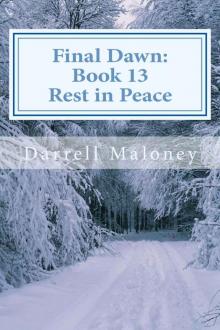 Rest in Peace
Rest in Peace This Changes Everything
This Changes Everything The Final Chapter
The Final Chapter It Can't Be Her
It Can't Be Her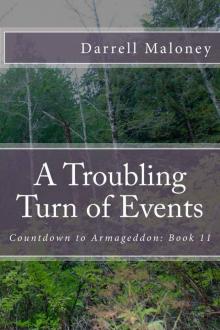 A Troubling Turn of Events
A Troubling Turn of Events The Blockade
The Blockade A Tearful Reunion
A Tearful Reunion Countdown to Armageddon
Countdown to Armageddon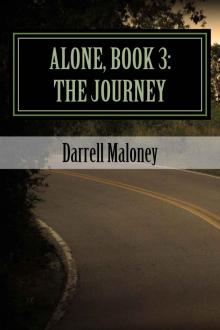 Alone, Book 3: The Journey
Alone, Book 3: The Journey The Army Comes Calling
The Army Comes Calling The Grim Reaper Comes Calling
The Grim Reaper Comes Calling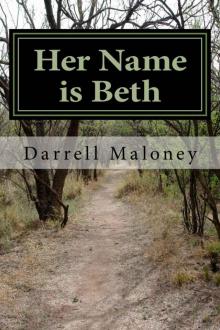 Her Name is Beth: Alone: Book 5
Her Name is Beth: Alone: Book 5 Red: The Adventure Begins
Red: The Adventure Begins Rise From The Ashes: The Rebirth of San Antonio (Countdown to Armageddon Book 3)
Rise From The Ashes: The Rebirth of San Antonio (Countdown to Armageddon Book 3) An Unkind Winter (Alone Book 2)
An Unkind Winter (Alone Book 2)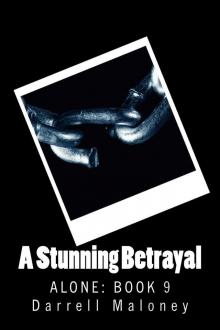 A Stunning Betrayal: Alone: Book 9
A Stunning Betrayal: Alone: Book 9 A Whole New World: Ranger: Book 2
A Whole New World: Ranger: Book 2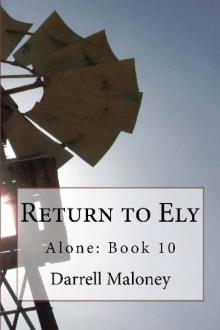 Return To Ely
Return To Ely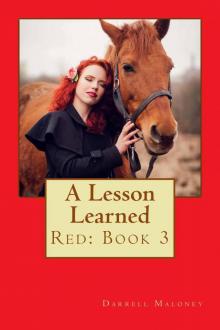 A Lesson Learned: Red: Book 3
A Lesson Learned: Red: Book 3 The Homecoming: Countdown to Armageddon: Book 5
The Homecoming: Countdown to Armageddon: Book 5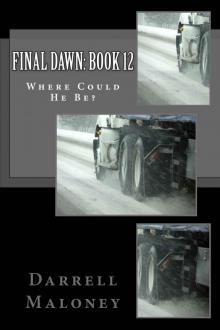 Final Dawn: Book 12: Where Could He Be?
Final Dawn: Book 12: Where Could He Be? An Acquired Taste
An Acquired Taste On Desert Sands: Alone: Book 6
On Desert Sands: Alone: Book 6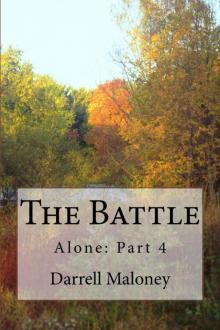 The Battle: Alone: Book 4
The Battle: Alone: Book 4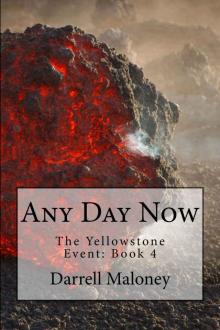 Any Day Now
Any Day Now Too Tough To Tame: Red: Book 2
Too Tough To Tame: Red: Book 2 No Help From Austin: Red: Book 5
No Help From Austin: Red: Book 5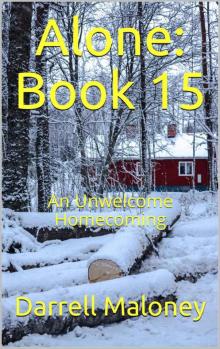 An Unwelcome Homecoming
An Unwelcome Homecoming A New Start: Final Dawn: Book 9 (Volume 9)
A New Start: Final Dawn: Book 9 (Volume 9)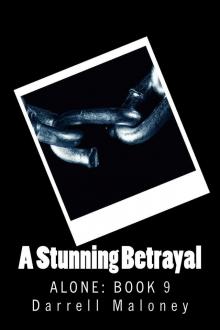 A Stunning Betrayal
A Stunning Betrayal An Undeclared War (Countdown to Armageddon Book 4)
An Undeclared War (Countdown to Armageddon Book 4) One of Our Own: Final Dawn: Book 11
One of Our Own: Final Dawn: Book 11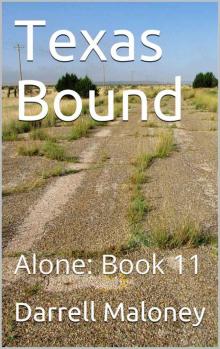 Texas Bound: Alone: Book 11
Texas Bound: Alone: Book 11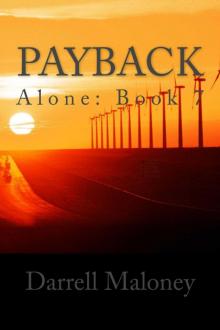 Payback: Alone: Book 7
Payback: Alone: Book 7 The Quest: Countdown to Armageddon: Book 6
The Quest: Countdown to Armageddon: Book 6 The Siege
The Siege The Yellowstone Event: Book 1: Fire in the Sky
The Yellowstone Event: Book 1: Fire in the Sky Return to Blanco (Red Book 4)
Return to Blanco (Red Book 4) The Search
The Search AFTER THE DUST SETTLED (Countdown to Armageddon Book 2)
AFTER THE DUST SETTLED (Countdown to Armageddon Book 2) Death Comes Calling (Ranger Book 3)
Death Comes Calling (Ranger Book 3)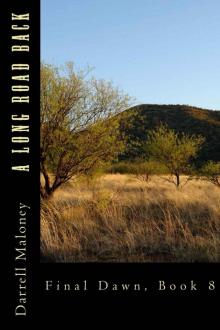 A Long Road Back: Final Dawn: Book 8
A Long Road Back: Final Dawn: Book 8